|
Customs
Customs of the Jamaica Defence Force
Introduction
This page is created to give Young Officers an idea of some of the Customs to
look out for on joining his unit. The visitor to this page will no doubt find it of
interest as it sets out the many customs of the JDF.
It is important to realise that there are many customs in the JDF that are not included on this page.
SECTION I
GENERAL MATTERS
CONDUCT OF AN OFFICER
- A very high standard of behavior and bearing is
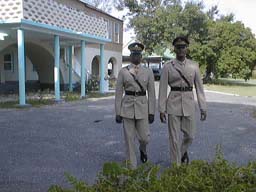 expected of an
Officer at all times and wherever he may be. expected of an
Officer at all times and wherever he may be.
- It must be remembered that the JDF is judged by the behaviour of all its members,
and that other ranks follow the example of their Officers.
SOCIAL AND OFFICIAL RELATIONS
The contrast between social and official relations may at first seem
paradoxical. If reprimanded for a fault an Officer must not brood over it, and must never
allow himself to become a man "with a grievance."
The Commanding Officer, the Adjutant, or the Officer’s Sub-Unit Commander may be
severe on parade, but this is always forgotten in the Mess.
- Off parade and in the Mess, Senior Officers should be treated with natural
courtesy due to their rank, age, experience and responsibility, but the young Officer must
not be frightened of them. The normal polite behaviour of a gentleman is all that is
required.
- It is an old custom of the Service to say "Good morning," or "Good
morning sir," as the case may be, to other officers when met for the first time that
day. It is for the junior to speak first.
- It is usual for Subalterns when addressing Captains or other Subalterns to use
only their name, not their rank. When speaking to a Senior Officer, however, and referring
to a Captain, the rank should be included, i.e., "Captain Smith gave instructions,
etc."
- Captains should only be called "Sir" by Subalterns when on duty.

LOYALTY
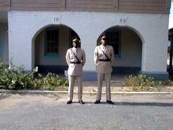 An
Officer must never belittle his regiment or corps in the hearing of outsiders. This is
being disloyal. An
Officer must never belittle his regiment or corps in the hearing of outsiders. This is
being disloyal.
An Officer may have to serve in Units other than his own and his behaviour should be
the same as in his own Unit.
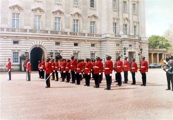 Esprit de corps must not tempt the Officer into
belittling other regiments or units; it is bad manners and does harm. A junior officer should
keep his opinions and criticisms to himself until asked for them. Esprit de corps must not tempt the Officer into
belittling other regiments or units; it is bad manners and does harm. A junior officer should
keep his opinions and criticisms to himself until asked for them.
Every Officer must be careful not to decry the "Force" in the presence
of civilians. There is a tendency to criticise the "powers that be" and, in
particular "HQ JDF" for any unpopular aspect of JDF life. Such criticism is
generally based on ignorance of the true facts and is consequently unjustified. In any
case it is bad for the JDF and achieves no useful purpose.

ATTITUDE TO ORDERS
- An Officer must never apologise for an order. To apologise for an order given by
him is weak; for that given by a superior is disloyal. An Officer must always carry out an
order to the best of his ability: if he disagrees with an order or thinks it wrong,
criticism should be made to the Adjutant or Sub-Unit Commander afterwards.
- If a Junior Officer has to implement an order, given by his superiors, which he
knows will be unpopular with his subordinates he must give it out as his own order and
take full responsibility for it.
- It is disloyal to pass on such orders in the form "The CO., or Company
Commander, wants us to, do, etc., etc., "as this implies disagreement on the part of a
junior with the policy of his superiors. Such orders must always start with the phrase
"I want, etc., etc, or "You will, etc., etc."
MARRYING YOUNG
- The JDF does not officially recognise the marriage of an Officer until he is 21
years of age and
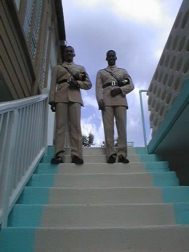
spent two years in an Officers’ Mess. The reason for this is that a young
Officer has much to learn before he becomes fully proficient. This includes the bookwork
of technical and tactical subjects as well as the practical side of soldiering and man
management. Man management is best learnt by being with the men as much as possible, both
on parade and off parade, playing games, or organising their sports and recreation. If an
Officer marries young he is bound to have extra interest outside his Army life and his
work and learning will suffer.
- A young Officer must take into consideration the financial difficulties which he
will encounter if he marries young.
- An Officer is entitled to marriage allowance at the age of 21, but few
Officers
will have the means or the ability to consider marriage at such an early age and still be
able to give the service to their regiment which the holding of a commission must imply.
- An Officer must obtain his Commanding Officer’s permission before getting
married

PARADE GROUND
- An Officer should never go between a squad on parade and its commander, or,
indeed, between it and any person who is connected with that parade.
PUNCTUALITY
- It is the duty of every Officer to be punctual for a parade or duty and it is bad
manners to be late for an appointment. If he makes a practice of always being five minutes
early an Officer will save himself many embarrassments.
- It is the Officer’s duty, however, to ensure that the men are not paraded
unnecessarily early just to ensure punctuality.
CURRENT EVENTS
- It is essential that an Officer keeps himself in touch at all times with the
international, political and military situation. This is expected of any intelligent and
educated person, and the Officer is also
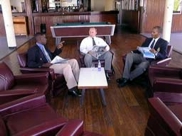 responsible for keeping his men in touch
with these matters. To keep himself up to date an Officer should read a good newspaper
daily and as many periodicals as possible. responsible for keeping his men in touch
with these matters. To keep himself up to date an Officer should read a good newspaper
daily and as many periodicals as possible.
- He should organize games, sports and other forms of recreation for his men.

FINANCIAL MATTERS
- For an Officer to write a cheque or demand on a field cashier for more than he
has in the bank, without prior arrangement with the bank, is not only dishonest but also
disgraceful.
- A dishonoured cheque may lead to a Court martial.
- Never, under any circumstances, write a "blank" cheque for anyone.
- All Officers should keep a record of their private accounts, especially on first
joining. To assist in this, cheque counterfoils should be filled in.
- An arrangement should be made by the Officer with his agent and/or bank for a monthly
statement to be forwarded to him. This should be very carefully checked with the
counterfoils and statement of account.
- An Officer should regulate his expenditure in order to avoid being "hard
up." Should he find himself very hard up, he should consult his Unit or Sub-Unit
Commander.
-
Cash
An Officer should never leave
money or valuables lying loose in his quarter. To do so puts his batmen in an unfair
position.
- The receipt of any money should always be acknowledged. When an Officer hands over any money or store he should always obtain a receipt.
- In this way he will ensure that he is free from blame in case of any loss or deficiency.
- Letters about money matters should be answered promptly.
-
Financial Responsibility
.
When an
Officer is put in charge of public funds or stores he is entirely responsible for their
safekeeping, and he will be required to make good any deficiencies or loss due to his
negligence.
- All Mess Bills, bills and subscriptions should be paid punctually. If an
Officer
is slack about payments it causes inconvenience to treasurers and secretaries of clubs and
business firms, besides being a discredit to the Officer, to the Unit and to the JDF.
- In the case of regular subscriptions Officers are recommended to arrange payment
by a banker’s order to ensure punctuality.

DRESS – PLAIN CLOTHES
- An Officer should be smart and well
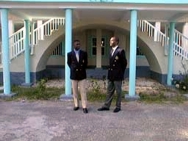 turned out at all times. This is most
important in plain clothes. turned out at all times. This is most
important in plain clothes.
- Old clothes do not prevent an Officer from being cleanly and tidily dressed.
- When buying plain clothes it will pay the officer to go to a good tailor, as the
clothes will last very much longer. They look better than cheap clothes when old, and can
therefore be worn longer. Above all, an Officer must avoid buying flashy or highly coloured clothes.
- As regards to the wearing of sports clothes and scarves in the Mess, Officers are
recommended to seek advice from the Adjutant or from some other Officer of the unit as
customs on this subject vary in different units.
next
|

 expected of an
Officer at all times and wherever he may be.
expected of an
Officer at all times and wherever he may be. An
Officer must never belittle his regiment or corps in the hearing of outsiders. This is
being disloyal.
An
Officer must never belittle his regiment or corps in the hearing of outsiders. This is
being disloyal. Esprit de corps must not tempt the Officer into
belittling other regiments or units; it is bad manners and does harm. A junior officer should
keep his opinions and criticisms to himself until asked for them.
Esprit de corps must not tempt the Officer into
belittling other regiments or units; it is bad manners and does harm. A junior officer should
keep his opinions and criticisms to himself until asked for them.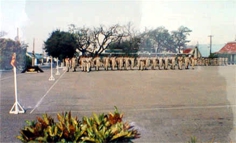
 responsible for keeping his men in touch
with these matters. To keep himself up to date an Officer should read a good newspaper
daily and as many periodicals as possible.
responsible for keeping his men in touch
with these matters. To keep himself up to date an Officer should read a good newspaper
daily and as many periodicals as possible.  turned out at all times. This is most
important in plain clothes.
turned out at all times. This is most
important in plain clothes.